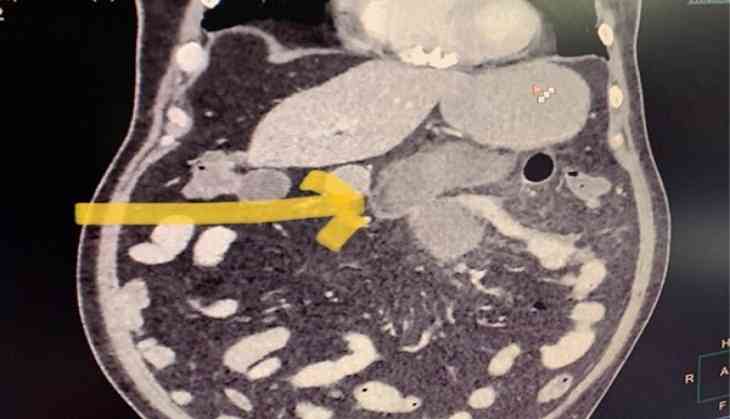
Amid the rising concern of black fungus cases in addition to the COVID pandemic, the rare cases of Mucormycosis of the small intestine have been reported in Delhi's Sir Ganga Ram Hospital.
A 56-year-old Delhi resident, Kumar lost his wife and other two family members due to
COVID. He had barely completed the last rites of his wife when he experienced pain in his abdomen. He had also tested positive for COVID along with his wife and been experiencing mild covid symptoms initially. His abdominal pain was considered gastritis/ stress-related and self-medication for acidity was taken which delayed proper treatment by three days. He was finally evaluated in the COVID emergency of Sir Ganga Ram Hospital. The CT scan revealed his small intestine (jejunum) had perforated. His COVID disease also had worsened by now requiring ventilator support.
Dr Ushast Dhir, senior consultant in the Department of Surgical Gastroenterology and Liver Transplantation in Sir Ganga Ram Hospital said, "Ulceration of Jejunam (First part of Small Intestine) in the patient raised my suspicion of fungal disease and patient was immediately started on antifungal treatment. We sent the portion of removed intestine for Biopsy."
The family of 68-year-old Ijaz was cheering up to know that their father had recovered from COVID. But later, he started having mild abdominal pain. He was a diabetic and had received steroids for treatment of COVID. The patient had no associated fever and the pain was very mild. His clinical examination also did not show any signs of intestinal perforation.
The CT scan revealed small intestinal perforation similar to the first one.
The biopsy confirmed the Mucormycosis of the small intestine in both patients. Both these patients had COVID and had diabetes but only one of them had received steroids.
Both these patients were operated by Dr Ushast Dhir, who revealed that these patients had similar intraoperative findings where the first part of the small intestine(jejunum) had outpouchings called diverticula and these diverticula had perforated along with surrounding ulceration.
Mucormycosis most commonly involves Rhino-orbital-cerebral system or the lungs.
Intestinal or GI mucormycosis is a very rare disease and most commonly involves the stomach or large intestine. These patients in the majority are immune-compromised. The majority of gastrointestinal mucormycosis is seen in organ transplant recipients. The cases treated at Sir Ganga Ram Hospital were unique as they had COVID and the small intestine (instead of stomach /colon) was involved in both.
GI mucormycosis is rare and the patient presents with vague abdominal symptoms. In recent times history of COVID exposure along with treatment with steroids should warrant an early CT scan of the abdomen, the doctors said.
(ANI)


